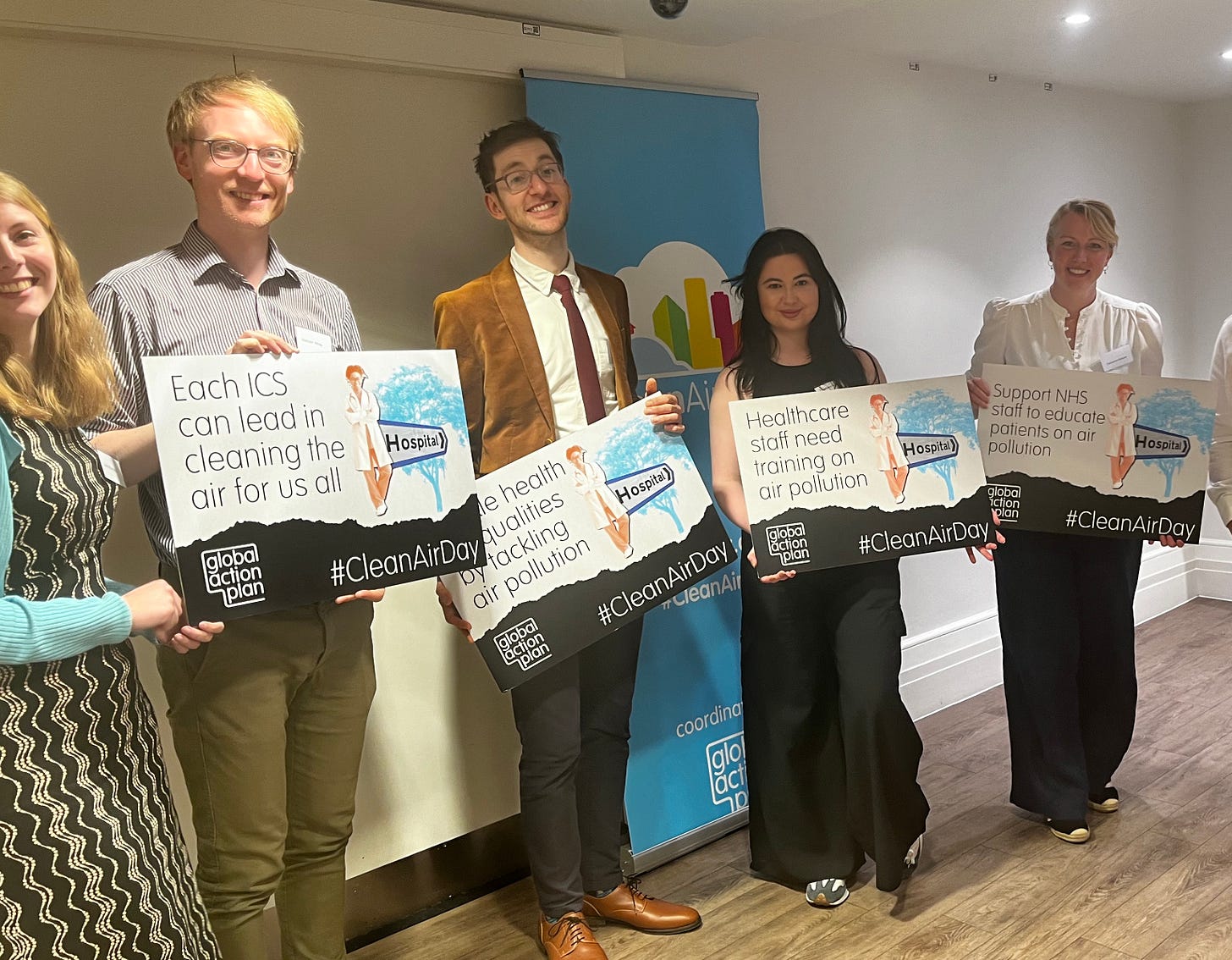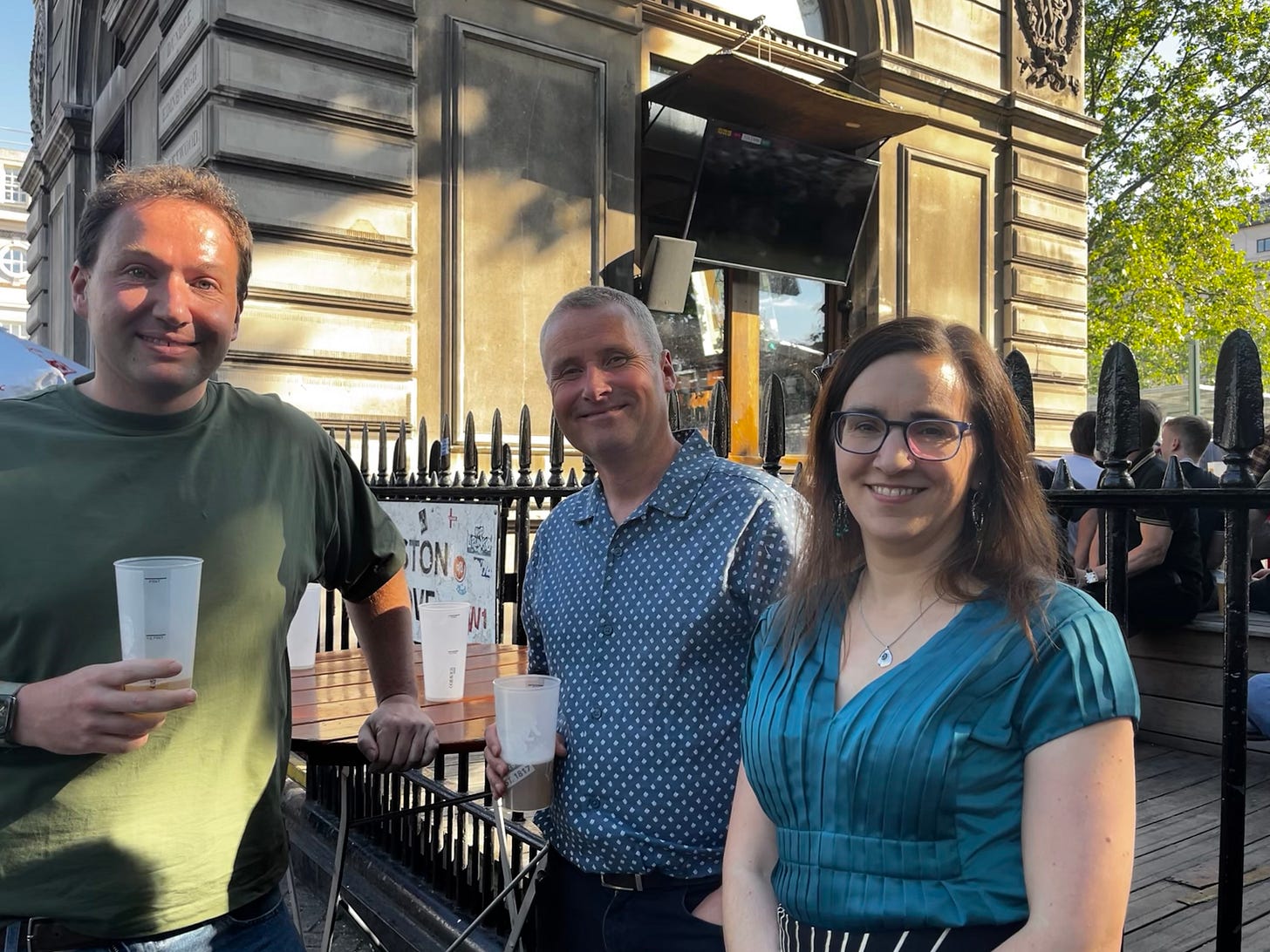Today is Clean Air Day!
It started not so clean - an alert that high levels of ozone are coming (we don’t talk so much about ozone, as the spikes happen less in London than other types of pollutants, but it can cause significant irritation of our airways). And a 6am run for Louise, where nitrogen dioxide was already getting close to daily limits - didn’t bode well for the day.
Onto the Victoria line (famously one of the most polluted, but thankfully only 20 minutes) and into the Wellcome Trust for the Cleaner Air, Healthier Lives Summit, organised by Global Action Plan, Camden Council, Great Ormond Street Hospital and with involvement of other excellent organisations such as Mums for Lungs.
The theme of the day was what health professionals can do to tackle air pollution. This fell into two broad camps: clinical approaches to integrating thinking and advice on air pollution into interactions with patients; and reducing emissions from the NHS itself. There is some overlap, for instance reducing air pollution outside neonatal wards - seems a vital, simple step but it takes joined up thinking to make that happen.
The links between air pollution and health may seem obvious, but to get institutions to shift focus and priorities can take major inputs. The Prevention of Future Deaths report (after the death of Ella Kissi-Debrah), the Chief Medical Officer’s report, the Every Breath We Take study and the Clean Air Hospital Framework were all cited as contributions to the shift in thinking within healthcare about air pollution.
Big topics
There was a huge amount of content through the day - enough for a month of blogs! But some themes and evidence stood out:
Health inequality, social justice and environmental racism. The founder of Choked Up stated that people of colour are exposed to 27% more air pollution than white people. Friend of this blog, Agnes Agyepong, CEO of Global Black Maternal Health, reminded the conference of the difficult choices people in low-quality housing living near main roads: do they open windows to reduce mould and other indoor pollution or keep them closed to keep traffic fumes out?
Children. Professor Holgate (who led work around the inquest into Ella Kissi-Debrah’s death) pointed out that the smallest babies take 60 breaths a minute compared to an adult’s 16. While using the rather scientific words “systemically bioavailable”, he got across the poignant message about how our understanding of fine particulate matter crossing into the bloodstream, across the placenta and into the unborn child completely changes the debate towards air pollution being a risk to the full life course. Shockingly, 2000 children die globally every day from the effects of air pollution.
And young people. Not always at the table in these discussions but the founder of Choked Up talked about their campaigns coming from the realisation of how bad her start in life had been in Lewisham. They’ve taken creative approaches such as hacking street signs to raise awareness. The connections between more physical activity, reduced car use (and hence both creation of and exposure to pollution), mental well being and green spaces were all mentioned as co-benefits for young people.
What healthcare professionals can do. Before this event, we were aware of a few initiatives such as London hospitals having air pollution data in patients’ records. But the overall sense seemed to be that doctors didn’t feel they could give any useful advice to patients to avoid exposure. This sense was overturned by a panel of doctors who talked about bringing it into conversations using resources such as these. However, the conference was also reminded of how much doctors have to squeeze into a short consultation. An exciting new unit on children’s environmental health is being established by friend of this blog, Dr Abi Whitehouse.
Car dependence. Always a hot topic - a few remarks through the conference about understanding car dependence like a disease and considering cars as an invasive species. Although reduction in petrol and diesel cars will have benefits, the move to electric vehicles is not an unalloyed good, as we’ve covered before. And a balanced discussion on how to encourage behaviour change towards active travel sensitively. A nice statistic was that, all things considered, the benefits to your health of cycling compared to driving are 50 to 1.
Public debate. Politics was kept out of the conference given the upcoming election! But the sometimes difficult public debate was mentioned, for example the backlash against campaigns on wood-burning. The need for active travel solutions to be cheap and accessible was highlighted.
New science. The shifts to understanding that the biggest health risk is actually cardiovascular (where many had assumed it was respiratory), new insights into the impact on brain health and the latest Global State of the Air report stating that air pollution is now the second leading cause of death.
Big questions
Overall a fantastic event but it left Louise with a couple of big questions and concerns:
The role of innovation and technology. This didn’t come up much - why? Just a sense that there is so much to do and we need to work step by step through addressing the health risks? Or a sense that everything has been tried?
Whether it’s right to bring together discussion of greening the health service (eg electric ambulances) with the health impacts of air pollution. Does this put air pollution into an environmental bucket, meaning it can be dropped when the health service is under pressure, rather than an issue that is fundamental to the health of our country?
Louise also had the opportunity to visit the new mural on Euston Road with air pollution sucking paint! Let’s hope it works… And then quickly nipped off to a Poetic Unity event in Peckham on Clean Air for the Ends. We intended to cover this tonight too but that’ll be one for next week, dear readers…
Post script
We got the exciting news that Air Aware Labs (our other guise) has been shortlisted for a Climate Action: Sustainable Impact award by BeLambeth. The public vote opens on Monday and we don’t know for how long! So please keep an eye out and vote for us if you see fit… we are up against some local titans such as Sustainable Ventures and Guys and St Thomas’ Hospitals!






